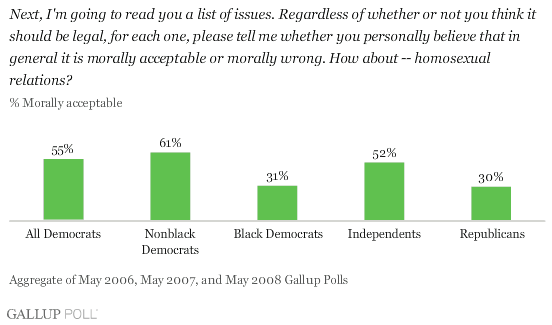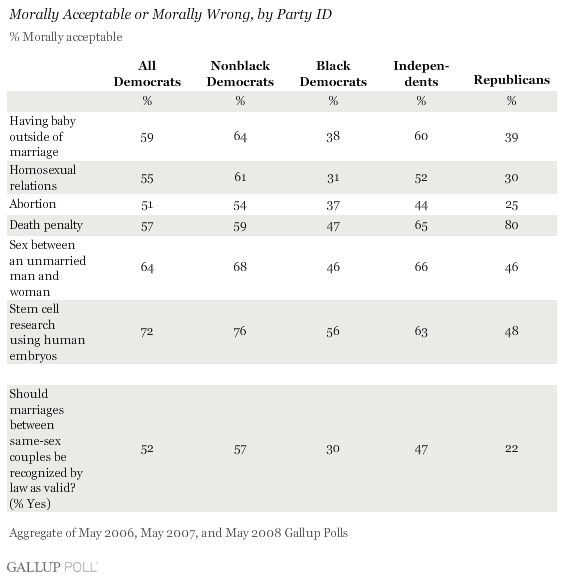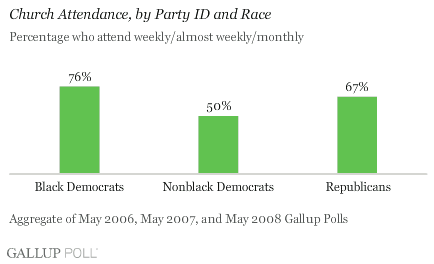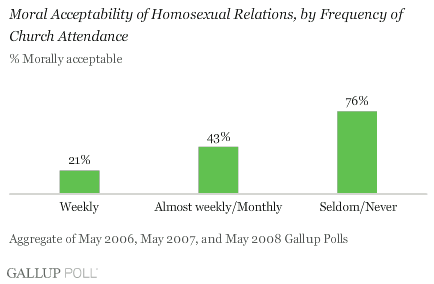PRINCETON, NJ -- Only 31% of black Democrats in America say homosexual relations are morally acceptable, roughly the same as the 30% of Republicans who agree, while very much different from the 61% of nonblack Democrats who say homosexual relations are morally acceptable.

The fact that black Democrats are much closer to Republicans' than to nonblack Democrats' position on this issue is noteworthy given that blacks overwhelmingly identify themselves as Democrats (to be discussed in detail below). The issue of black views on family-related moral issues is also noteworthy given the recent vote in California to approve Proposition 8, which effectively amended the state constitution to define legal marriage as only between a man and a woman. Exit-poll results after that vote on Nov. 4 suggested that black California voters had overwhelmingly voted in favor of the amendment, while overall, Democrats in California overwhelmingly voted against it -- essentially confirming the national attitude structure apparent from Gallup's analysis.
Gallup each year asks Americans to indicate whether they believe that each of a series of behaviors or actions is morally acceptable. The data reported in this article are based on an aggregated sample of the results from May 2006, May 2007, and May 2008, involving interviews with more than 3,000 Americans.
In this particular aggregate of data, 65% of blacks identify themselves as Democrats (and another 16% say they lean toward the Democratic Party). Only 5% identify as Republicans. Yet, as seen in the accompanying table, there are major gulfs between the attitudes of black Democrats and the attitudes of nonblack Democrats on a number of moral issues, and in most instances, blacks come much closer to the positions of Republicans than to those of Democrats.

There is an exception to the basic conservatism of black Democrats on the issues listed in this table. Black Democrats are actually less likely to find the use of the death penalty morally acceptable than are nonblack Democrats (or Republicans). But on the other moral-based issues included, black Democrats are consistently much more conservative than nonblack Democrats.
Just 30% of black Democrats say they would agree that marriages between same-sex couples should be recognized by law as valid, compared to 57% of nonblack Democrats. Black Democrats are not quite as conservative on this policy issue as Republicans (among whom just 22% favor legalization of same-sex marriage), but are closer to Republican attitudes than to nonblack Democratic attitudes. And, as noted at the beginning of this story, black Democrats' views on the moral acceptability of homosexual relations are almost identical to those of Republicans, and the attitudes of both blacks and Republicans are significantly different from the attitudes of nonblack Democrats on this issue.
One of the underlying explanations for the divergence between the views of black and nonblack Democrats on these moral issues is religion. Black Democrats are much more religious than nonblack Democrats, and religion is highly related to views on homosexual relations.


In general, it appears that black Americans may be conflicted in their attitudes toward certain values issues such as same-sex marriage and homosexual relations. Despite the liberal orientation of the Democratic Party toward moral issues, blacks, perhaps because of their high degree of religiosity, are pulled in the other, more conservative direction that is typical of Republicans. In the case of same-sex marriage, it appears that the power of religion in shaping black attitudes, coupled with the fact that black turnout in California was driven up in general because of the high-profile candidacy of Barack Obama for president, helped push Proposition 8 to victory.
Survey Methods
Results are based on telephone interviews with 3,022 national adults, aged 18 and older, conducted in May 2006, May 2007, and May 2008. For results based on the total sample of national adults, one can say with 95% confidence that the maximum margin of sampling error is ±2 percentage points.
Interviews are conducted with respondents on land-line telephones (for respondents with a land-line telephone) and cellular phones (for respondents who are cell-phone only).
In addition to sampling error, question wording and practical difficulties in conducting surveys can introduce error or bias into the findings of public opinion polls.
